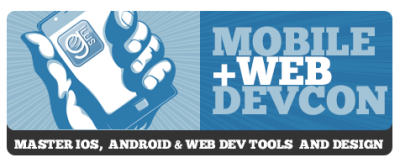By Melih Onvural, Technical Product Manager, Tokbox (a Telefonica Digital company)
I recently had the pleasure of being a part of the Mobile + Web developer conference held at the Hilton Hotel in San Francisco. I spoke on a panel about where development was headed in a world where Web + Mobile are the two predominant platforms.
 I was in great company – fellow panelists included John Hammink, a QA engineer from Mozilla; Jonathan Smiley, Partner at Zurb (building their own HTML5 framework) and Ted Drake, a senior accessibility engineer from Intuit.
I was in great company – fellow panelists included John Hammink, a QA engineer from Mozilla; Jonathan Smiley, Partner at Zurb (building their own HTML5 framework) and Ted Drake, a senior accessibility engineer from Intuit.
Walking away from the panel, I found myself quite convinced of a few things that beforehand I had only held as loose opinions:
1) Ultimately a common language set will prevail… but not for the reasons you’re thinking
Today, as we all know, it takes a developer a long time, and real effort, to be available on all platforms (namely web, iOS, and Android) from day one. The reason is simple – HTML5 based applications don’t perform as well as their native counterparts. If anyone learned this lesson the hard way, it was Facebook, but other app developers have similar horror stories.
Further, it takes first-world incomes to be able to buy the top of the line smartphones from the likes of Apple, Samsung, and Motorola. Most of these devices are extreme luxury items outside of the US and Western Europe. As a result, an already saturated app store for existing platforms is a daunting marketplace for new and emerging apps.
Given all of that, we asked ourselves… but what if the native API was HTML5?
The upcoming launch of Firefox OS is exciting exactly because developers targeting untapped markets (Latin America, South America, Africa) using skills (HTML5, JS, and CSS) that they already have is a large ocean of opportunity.
Firefox OS phones, a device our Telefonica Digital family have dedicated significant time to developing, may not compete on hardware specs with the iPhones we have in the US and Western Europe, but, as a platform for the masses, their reach could be much greater, open much larger markets, and open many more interesting opportunities in the years to come. Simultaneously, as mobile browsers continue to invest in speed and quality, a second wave of HTML5 apps wrapped in native application bindings could make a comeback.
The sum of these parts is that developers who have built HTML5-based apps will be well positioned to take advantage of the next generation of smartphone devices, but the panel agreed that today the burden lies on the developer to build multiple native applications.
2) Frameworks are only as powerful as the developer who wields them
Ted Drake spoke a lot about how accessibility has been pushed to new, and powerful, places with the emergence of smartphones and tablet devices. This, I thought, was one of the better topics we debated.
It started with the thesis that frameworks are used by developers who don’t know what they’re doing as a short cut or to quickly prototype their work. However, Jonathan Smiley spoke up for framework users by giving the example of his agency who had built a framework that they used to quickly, and robustly, build responsive applications for their clients. Zurb knew what they were doing, and knew how to use the tool effectively.
Ultimately, I think the entire panel agreed that the issue with frameworks is speed more than complexity. If people are moving too fast, while not understanding the programming paradigm, and producing second-class applications as a result, then of course the end result is likely to be weak. But a framework in the right hands used to solve the right problems can really help development, especially when it has to work across both mobile + web at launch.
3) Regardless of the target audience – mobile + web will both be part of the solution
One of the questions from the audience was about whether our discussions over the course of the hour applied equally to enterprise as well as consumer. At TokBox we’ve learned over the last two years of the OpenTok platform that solutions need to exist wherever the users are.
Doing a customer support app? People may want to call in from a website, a native app, or from the phone.
Heading to the doctor’s office remotely? Requiring patients to buy an iPad would make the solution impossible for most doctors, but having a solution that works as long as the patient has a web connection opens this door.
Mobile + Web is not a consumer only phenomenon, though the headlines are dominated by these types of products. The truth is that mobile + web is the new paradigm within which all products are being built.
I’d love to hear more about where you think mobile + web development is going so do post a comment below…


![[Guest Post] Survival can mean getting down and dirty with the start-ups](https://en.blogthinkbig.com/wp-content/uploads/sites/5/2014/07/shutterstock_189811220.jpg?resize=p%2Co)






